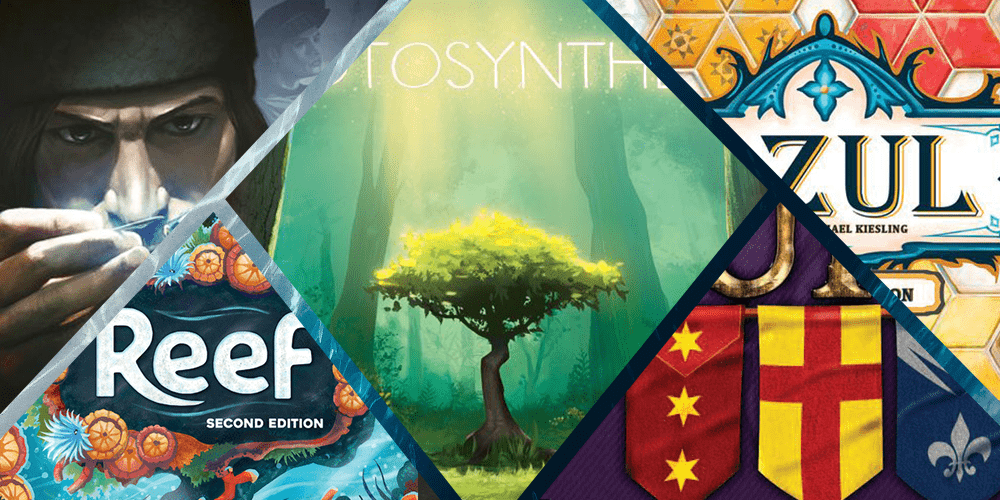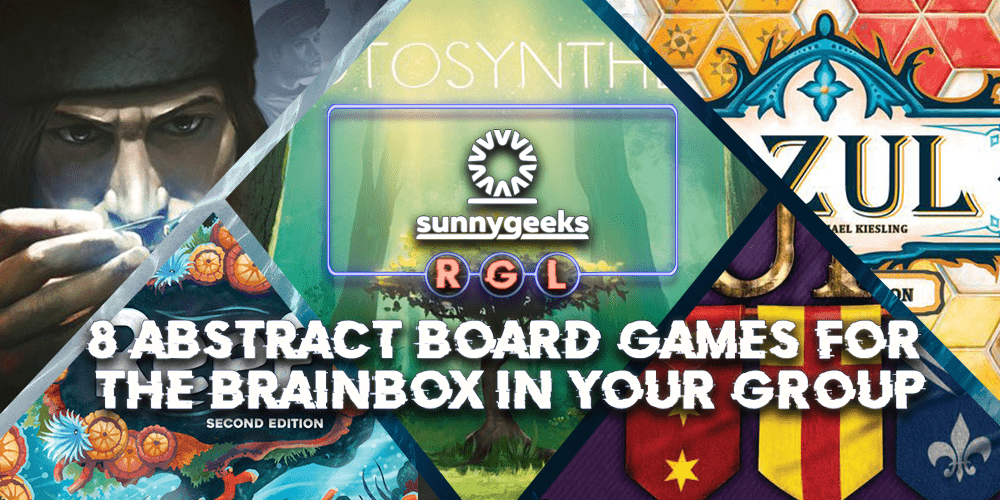Take all the wizards, warriors, and goblins you want. Sometimes you just want to sit down with a simple board game, make a cup of tea, and put your brain through the wringer.
Abstract games have been with us since ancient times. These helped teach strategy, numeracy, abstract reasoning and were a great bonding activity after spending a hard day trying not to die before you were 28.
So, here are eight of our favorite modern abstract classics that can belong in everyone’s bookcase.
Starting with.
8. Onitama (2014)
The king is dead, all hail the Sensei
Who has time for Chess? Not Shimpei Sato, that’s who! Building on the core principles of the game of kings, Onitama simplifies things be bringing down the board size and creating two paths to victory. If your sensei (king) manages to cross the board and end up in your opponent’s chair you win, or if you manage to take them out before they do so. Movement is also tied to card that a randomly drawn before each game, removing barriers to entry, and making it easy to play at once. Throw in a couple of great expansions, and you’ve got a game that will potentially last a lifetime. me.
7. Photosynthesis (2017)
Grow the forest
For fans of wee tiny trees, there’s simply nothing better. Published by Blue Orange in 2017, Photosynthesis’ forest theme covers a great game of area majority and control – letting you place trees that block your opponent’s access to sunlight while you attempt to do the same. Each and every move has long-term ramifications, forcing players to carefully consider their actions. With clean mechanics but surprisingly deep play, the buy/plant/grow/collect system keeps things simple enough grasp but rewarding to master. Also, just look at the trees – look at them!!
6. Reef (2018)
Now grow the reef!
A lightweight follow-up to the success of Azul, Reef asks players to tot-up points by building their own reef. A game of resource management and careful decisions, Reef’s key selling point is its verticality. Players add elements by stacking them on existing spots on your board. While this may lack the complexity of other games on this list, limiting choice and tying scoring to the cards you draw can make it super accessible. However, if multiplayer solitaire is your jam – don’t hesitate to plumb the depths and give this bright masterpiece a go.
5. Tsuro (2004)
Find enlightenment
Play a tile. Move your piece. And…that’s basically it. Almost painfully simple, Tsuro makes players out to be dragons stunting through the sky. Played across a six-by-six grid, each turn sees players place a token and follow the line shown – moving their piece until you can move no more. Hit an opponent, you’re out. Off the board, you’re out. But before long, what should be a one-off novelty develops its own meta as you trick players into awkward spaces, develop a sixth-sense about your own spacing, and balance the two. And with 15 minutes per game, you start getting very good very fast.
4. War Chest (2018)
Tactics in a box
While abstracts traditionally don’t have much truck with theme, Alderac’s War Chest does something very special indeed. Pitched as a training tool for an heir apparent, War Chest is a game of abstract combat, strategy, and immensely satisfying components. Each game sees players picking out their pieces to capture an opponent’s spawn point, take the fight to their enemies, or use clever ruses and ploys to seize the upper hand. Combining hand management with careful, cautions play – this truly feels like the reproduction of a grand strategy game that would not feel out of place in any fantasy novel.
3. Splendor (2014)
Become a gem of a gem trader
Too anxious to watch Uncut Gems? Maybe try something a little less intense…or so you think. Simulating the lives of gem merchants during the renaissance, players buy and sell stones to own mines, stores, and secure the patronage they need to come up on top. In practical terms, this is a bullet-proof game of buying, selling, and stopping your opponents from getting the resources they need. Combining simple gameplay with difficult decisions, Splendor is a close-fought game for two or a pacy game for higher player counts. Add in gorgeous art and a brilliant series of modular expansions, and this cut-price marvel is a no brainer.
2. Azul: Summer Pavilion (2019)
Can you create the most beautiful pavilion?
By this point, everyone and their dog is aware of Azul. A world-class abstract marvel, players pick up tiles to fill their personal boards. Matching patterns and filling rows…but often ending up penalised or punished for being a little bit too greed. The gorgeous looking Summer Pavilion is a semi-sequel to the original and adds an extra degree of tactical nuance. Tiles are no longer placed as soon as they are drafted – with placement now taking place one-after-the other. This speeds up game time and makes the game a lot less punishing than its older brother. The addition of wilds also opens up additional strategic options that players can take advantage of in future turns. Offering true refinement, this is a great pick for a glorious summer’s day.
1. The Duke (2013)
Levy. Maneuver. Conquer.
Combining depth and accessibility, the Duke is considered a classic for a reason. Inspired by chess, the game is played on a six-by-six board and sees players place and move their units in an attempt to take out their opponent’s Duke. However, there are a few essential caveats. Firstly, each time a piece moves it ‘flips’ to its opposite side – giving different movement or attack options. Wizards can send out ball of fire that expands as they flip. Rangers can stalk and attack around them. And Footmen can cut and hew with their halberds. The game is also highly modular, with a range of expansions that can be brought into play and literally dropped into play through the game’s bag building mechanic. This means players need to combine long-term strategy with minute-to-minute tactics depending on what pops out of the bag next. Simple, rewarding, and immensely replayable.
What abstract board games do you play for a brain teaser? Tell us in the comments!





We really enjoyed playing Azul: Summer Pavilion with our game group. The ability to get bonus tiles for completing sections of the board is very nice, as is earning points for specific color or number sets.